What is Grrrr
Create Your Own Grrrr Meme Grrrr
GrrrrGrrrr
“Grrrr” is an onomatopoeic representation of a growling sound, widely used in text, memes, and various forms of digital communication to convey a range of emotions or actions.
🤨 Meaning
Primarily, “Grrrr” signifies a growl, an animalistic sound made by creatures like dogs, bears, or even humans. In human communication, it's a highly versatile expression used to convey strong emotions such as anger, frustration, and annoyance. It can also denote playful aggression, teasing, or a deep, guttural sound of determination or satisfaction. The precise meaning of “Grrrr” is largely dependent on the context in which it is used.
📖 Origin
As an onomatopoeia, “Grrrr” directly imitates the primal sound of a growl, making its linguistic origin rooted in the natural world. Unlike some internet memes that originate from a single viral event, the textual representation “Grrrr” has evolved organically to become a universally recognized shorthand in online communication, comics, and animated media. It effectively conveys the growling sound and its associated emotional states. This expression is frequently seen across platforms like YouTube, TikTok, and other social media, where users employ it to express mock frustration, playful annoyance, or strong resolve, often accompanied by visual cues that emphasize the intended emotion, making it a common element in reaction content and short-form videos.
🎙️ Usage
“Grrrr” is a highly versatile expression suitable for numerous informal and expressive communication scenarios. It's particularly effective when one wishes to convey strong emotions quickly and impactfully, often with a touch of humor or dramatic flair. For instance, it's commonly used for expressing frustration or annoyance when faced with an irritating situation, such as 'My computer crashed again, grrrr!' It also conveys playful aggression or teasing among friends, like 'You ate the last cookie? Grrrr, I’ll get you next time!' Furthermore, “Grrrr” can signify determination or intense resolve, as in 'I'm going to finish this project tonight, grrrr!' Lastly, it's frequently employed as a humorous mock threat or warning, 'Don't touch my fries, grrrr!', or simply to represent an actual growl in descriptive writing, comics, or memes.
🖼️ Related Images










